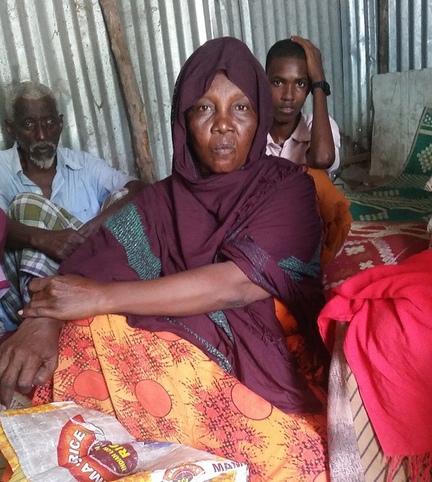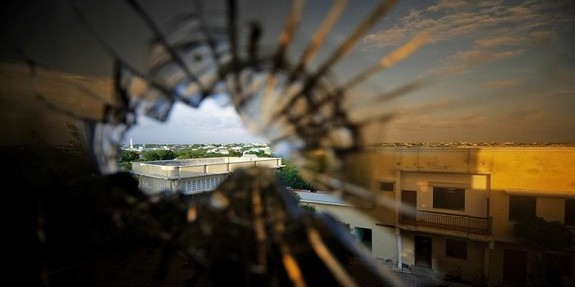No Hearts, No Minds, The War on Terror in Africa Part 1 is a new ZAM-AIPC transnational investigation. It shows that a 'war only' strategy creates more and more terrorists in the eastern and western regions of the continent. In this chapter: Somalia.
Abdi Mohamed (26) looks sadly at his empty hands. A few months ago these hands still held a gun, but since he defected from Al Shabaab on the promise of amnesty from the Somali government, that gun is gone. What has happened to it, he can only guess: it could be that Somali government soldiers are fighting his former Al Shabaab ‘comrades’ with it, but it is more likely that the corrupt syndicates and rogue individuals in that government army own it now. It has possibly been used to rob a shop, or rape a woman he does not know. Women are raped by government men every night in the camp for ‘Internally Displaced People’ in Mogadishu where Mohamed now resides
At first he joined the Somali army, but he left when there were no salaries. At least in the camp, one eats. Going back to Al Shabaab is not an option. “They will shoot me right away,” he says. “I am a traitor.”
Abdi Mohamed had never been a political activist. Even the invasion and occupation of Somalia by Western-backed Ethiopia in 2006 had passed him by in his remote village in Lower Shabelle. It was simply that one day, Al Shabaab arrived: a well-organized militia, prepared to take over the municipality and the court. It had been practical to join them. It meant a modest salary and some food for his family.
Women find Al Shabaab's rules bothersome, but they comply
Interestingly, Al Shabaab was and is not generally hated or despised in Lower Shabelle. “They brought good management,” is a common opinion I hear when I venture out here in August, dressed in full hijab. I usually cover my hair and wear long skirts and sleeves, but even that is seen as ‘dangerous’ in this territory. The fabric of the hijab must be thick and dark; the skirt must not just be long, but also so wide that any shape of the body is well hidden. Like me, other women find all these rules bothersome, but they comply. It is simply easier. Similarly, market vendors and farmers at the market here in the Bal'Ad district dutifully pack and unpack their wares five times per day to render the obligatory five-times-daily mosque visits (“Off to the mosque with you!” say the armed young men).
Families in Lower Shabelle merely hope that none of the militants develop an attraction for their daughters. Then you’d have to deal with the armed youngster knocking at your door, pointing and saying “I want this girl for my wife.” They also keep quiet about their actual views on Islamic extremism and the militia that personifies it. Criticism of the rulers can be, and is, punished by death.
Order and peace
But many say that they do receive something in return. “Order and peace,” says farmer Hassan Jamal (59). “At least I can bring my wares from the farm and sell them here. I don’t get robbed by criminals or marauding soldiers.” Many share his views. “Perhaps it would be better if we had a strong government,” says market trader Mady Nurow (45). “A government that could provide rule of law and a quiet trading environment, not to mention public services like health and education. But we don’t have such a government in Somalia. If the government army would win a fight against Al Shabaab tomorrow and take over the administration in the region, Al Shabaab would be back by midday. And then all those who had welcomed the government would be in real big trouble.”
A woman in tight long skirt, sans hijab and with sunglasses, picking up her child at a private school in Mogadishu, only partially agrees with him. “Al Shabaab is terrible. They are against women and democracy. They murder you if you stand up for your rights. That's why I am a strong supporter of our government. But it is true that it is too weak and corrupt. They just need to be stronger.”
"There can only be peace if corruption disappears"
Somalia’s people have had to endure more suffering than perhaps any other nation in the region. Abdi Mohammed shares his shelter in the refugee camp with Aamin Ahmed Ibrahim (55), who lost her seven children in an explosion during a battle between the government army and Al Shabaab. She is left with one child, a boy, now blind: the same explosion claimed his eyesight. She tries to talk to me about how much she wants peace, and maybe some help, but all she can do is cry. Hawo Abdilahi Ali (26) lost her husband, a soldier in the government army, and is supposed to get a military pension. But none is forthcoming, and she can’t buy food for her five children, so she now lives in the camp with them. At least there is food here from Turkish aid workers.

People in Somalia want what all people want: a place to live, work and bring up children. But their government, despite millions in Western military and development support, cannot even pay its teachers or clinics. Neither can it protect civilians from the grenade attacks that are carried out regularly by Al Shabaab on buildings in the town. This is probably why a majority of respondents to a mini survey I conducted in Mogadishu, Lower Shabelle, and Middle Shabelle say the government can only ensure peace as corruption disappears.
But how do we ensure this? Journalists and activists try to raise the important questions and hold the government accountable for the high-flying lives of ministers, the wastages, and mismanagement, but we get little support. And if you ask government directly what happens to all that donor money, like I did, you don’t get very far. “The teacher salary money was used for the war, because the war is very costly,” was one answer I received. “But the soldiers have also not received wages in months,” I objected, but after that I got no response at all. I knew that to continue asking would mean a diatribe (“Are you the police? Are you with the FBI?”). It had happened to me before.
Since the war began in 2006, forty-five journalists have been killed in Somalia. Another dozen are in prison on unclear charges.
Photo: Image by United Nations Photo


